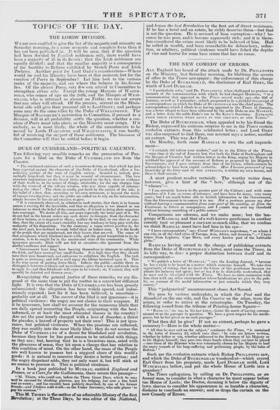THE NEW COMEDY OF ERRORS.
ALL England has heard of the attack made by Dr. PHILLPOTTS on the Ministry, last Saturday morning, for blabbing the secrets of office to the Times newspaper ; the enforcement of this charge by the Duke of BUCKINGHAM, the disclaimer of Earl GREY, the wrath of Lord DURHAM.
" I particularly refer," said Dr. Puir.trorrs when challenged to produce an instance of the communication with which he had charged Ministers, " to a communication that appeared in the Times several weeks ago—the 22d of January, as well as I remember—which purported to be a fitithtid transcript of a correspondence in which the Duke of BUCKINGHAM was the chief party. The correspondence which I allude to as having appeared in the Times of January, . was a letter alleged to have been addressed by the noble Duke to HIS MAJESTY, and a letter from the noble Duke's son to the KING'S Secretary. EXTRACTS FROM THESE LETTERS WERE GIVEN IN THE COLUMNS OF THE TIMES."
The Duke of BUCKINGHAM, when appealed to by his friend the • Bishop, expressed his extreme surprise to see in the Times certain verbatim extracts from this celebrated letter ; and Lord GREY was also surprised to find there, one account says a notice, another an extract. This was Act First.
On Monday, forth came RADICAL to own the soft impeach- ment— " I certainly did inflirm your readers," said he to the Editor of the Times, " some time at the end of :January last, that both the Duke of Buckingham and the Martinis of Chandos had written letters to the King, urging his Majesty to withhold his approval of the measure of Reform as proposed by his Majesty's Government ; and I gave extracts from that of his Grace, which extracts he acknowledges to have been copied verbatim. Hue I became possessed of any knowledge of the letter and OE THE EXTRACTS, is Within my own bosom, and there it shall remain."
A most prudent resolve certainly. The worthy writer does, however, give a hint of the " how," although not of the " whence"-
" I am certainly known to the greater part of the Cabinet ; and with some members of it I am on terms of intimacy, and have been for many, Very many years; but I am much better able to furnish information to the Government, than the Government is to convey it to me. Not a postman passes my door. without leaving a communication front some part of the country, or from the Continent, in letters or newspapers, and I cannot step over my threshold without learning something of a public nature."
Comparisons are odorous, and we make none; but the lan- guage of RADICAL and that of a well-known gentleman in another comedy (not so pleasant a one) are so much alike, that we confess- we think RADICAL must have had him in his eye-
" I have correspondents," says Count Wintersen's majordomo, " on whom I can rely, in all the chief cities of Europe, Asia, Africa, and America."—" I have- letters from Leghorn, Cape Horn, and every known part of the habitable globe."
RADICAL having owned to the charge of publishing extracts from the Duke of BUCKINGHAM'S letter, next came the Times, in its lofty way, to draw a proper distinction between itself and its correspondent-
" We publish a letter of "says the Leading Journal, " because
he has a right to be heard in a matter which concerns himself. We take this opportunity of stating, that we insert the letters of this gentleman because we admire his industry and spirit ; but we beg it to be distinctly understood, that he must not be iihmtl:fied with the Times. We have no more connexion with him than with any other correspondent whose lucubrations we give to the pub- lic, on account of the useful information or just remarks which they may convey."
This " judgmatical" announcement closes Act Second.
We pass by various underplots, in which the Post and the Standard on the one side, and the Courier on the other, were the actors, in order to arrive at the catastrophe. On Tuesday, the following issued from the tribune of Printing-house Square- " RADICAL,' we see, in his last letter claims the merit of having commu- nicated to us the passages in question. Ve have a great respect for his intelli- gence, but he has given us no such passages."
What then did he give? If not an extract, perhaps he gave a summary ?—Here is the whole matter-
" All that he ever said on the subject," continues the Times, "is contained in the letter of January 23, which runs thus: t In vain are letters written, whether by father or son, whether addressed to the Secretary of his Majesty or to his Majesty himself; they pass into those hands where they can best be placed —into those of the Minister who was voluntarily chosen by his Majesty to heal the angry -wounds of his long-suffering and petitioning people, by the balm of Reform.' " Such are the verbatim extracts which Bishop PHILLPOTTS saw, and which the Duke of BUCKINGHAM wondered at—which scared Earl GREY from his propriety, made Lord DURHAM scold, Lord WiricHiLsEa. bellow, and put the whole House of Lords into a quandary! The Times epiloguizes, by calling on Dr. PHILLPOTTS, as an honest man, to consider in what a character he must appear before tile House of Lords; the Doctor, deeming it below the dignity of lawn sleeves to consider his appearance in so humble a character,, disdains to vouchsafe an answer; and so drops the curtain on the new Comedy of Errors.






















 Previous page
Previous page